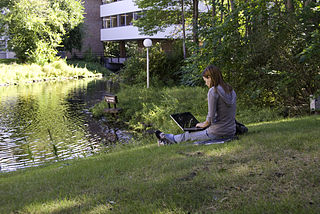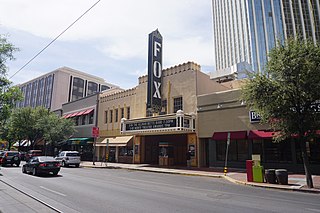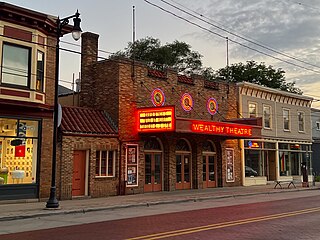
Muskegon County is a county in the U.S. state of Michigan. As of 2020, the population was 175,824. The county seat is Muskegon.

Muskegon is a city in the U.S. state of Michigan, the county seat of Muskegon County. Situated around a harbor of Lake Michigan, Muskegon is known for fishing, sailing regattas, and pleasure boating, and as a commercial- and cruise-ship port. It is a popular vacation destination because of the expansive freshwater beaches, historic architecture, and public art collection. It is the most populous city along Lake Michigan's Eastern shore. At the 2020 United States Census, the city's population was 38,318. The southwest corner of Muskegon Township, the city is administratively autonomous.

Whitehall is a city in Muskegon County in the U.S. state of Michigan. The population was 2,706 at the 2010 census. The city is located in the southwest corner of Whitehall Township. Montague is its neighbor.

The Fox Theatre is a performing arts center located at 2211 Woodward Avenue in Downtown Detroit, Michigan, near the Grand Circus Park Historic District. Opened in 1928 as a flagship movie palace in the Fox Theatres chain, it was at over 5,000 seats the largest theater in the city. Designed by theater architect C. Howard Crane, it was listed on the National Register of Historic Places in 1985.

Muskegon Community College (MCC) is a public community college in Muskegon, Michigan. The college offers 49 associate degree programs and 33 certificate programs. The college's main campus is located on a 111-acre campus in Muskegon, with extension centers in Ottawa and Newaygo counties.

The Dorothy and Charles Mosesian Center for the Arts is a nonprofit multidisciplinary arts venue on the Charles River in Watertown, Massachusetts, United States. The 30,000 square foot center, located in an historic 1894 manufacturing shop of the U.S. Army's Watertown Arsenal, houses a 339-seat main stage theater, a 100-seat black box theater, exhibition galleries, art classrooms, and rehearsal studios. Mosesian Arts is located six miles from downtown Boston, borders Brighton and the Charles, and is accessible from surrounding suburbs and MetroWest.

Heinz Hall is a performing arts center and concert hall located at 600 Penn Avenue in the Cultural District of Pittsburgh, Pennsylvania. Home to the Pittsburgh Symphony Orchestra (PSO) and the Pittsburgh Youth Symphony Orchestra, the 2,676 seat hall presents about 200 performances each year. Originally built in 1927 as Loew's Penn Theatre, the former movie palace was renovated and reopened as Heinz Hall in 1971.

Proctor's Theatre is a theatre and former vaudeville house located in Schenectady, New York, United States. Many famous artists have performed there, including Mariah Carey, Britney Spears, Hal Holbrook, Ted Wiles, and George Burns, as well as many others. It has one of the largest movie screens in the Northeast.

The San Diego Repertory Theatre is a performing arts company in San Diego, California.

The Fox Tucson Theatre is located in downtown Tucson, Arizona, United States. The theater opened on April 11, 1930 as a performance space in downtown Tucson. It hosts a wide spectrum of events and concerts featuring a variety of performing talent, ranging from ballets, to jazz, contemporary pop, world music and rock acts.

An atmospheric theatre is a type of movie palace design which was popular in the late 1920s. Atmospheric theatres were designed and decorated to evoke the feeling of a particular time and place for patrons, through the use of projectors, architectural elements and ornamentation that evoked a sense of being outdoors. This was intended to make the patron a more active participant in the setting.

The ten-story Fine Arts Building, formerly known as the Studebaker Building, is located at 410 S Michigan Avenue across from Grant Park in Chicago in the Chicago Landmark Historic Michigan Boulevard District. It was built for the Studebaker company in 1884–1885 by Solon Spencer Beman, and extensively remodeled in 1898, when Beman removed the building's eighth (top) story and added three new stories. Studebaker constructed the building as a carriage sales and service operation with manufacturing on upper floors. The two granite columns at the main entrance, 3 feet 8 inches (1.12 m) in diameter and 12 feet 10 inches (3.91 m) high, were said to be the largest polished monolithic shafts in the country. The interior features Art Nouveau motifs and murals by artists such as Martha Susan Baker, Frederic Clay Bartlett, Oliver Dennett Grover, Frank Xavier Leyendecker, and Bertha Sophia Menzler-Peyton dating from the 1898 renovation. In the early 20th century, the Kalo Shop and Wilro Shop, firms owned by women and specializing in Arts and Crafts items, were established in the Fine Arts Building.
The West Michigan Symphony is a professional orchestra made up of 60 core musicians, performing at the Frauenthal Center for the Performing Arts in Muskegon, Michigan. The current Music Director/Conductor is Scott Speck. The Orchestra performs eight concerts annually, featuring a range of repertoire and guest artists.

The State Theatre is a movie palace in Ann Arbor, Michigan, designed by C. Howard Crane in the Art Deco style.

The Ramsdell Theatre is a historic playhouse theater building and opera house at 101 Maple Street in downtown Manistee, Michigan. The building was financed by local businessman and politician Thomas Jefferson Ramsdell and was built in 1902. It replaced the town's two previous opera houses which had been destroyed by fire, one in 1882 and the other in 1900. Besides producing plays the facility was later used as a movie theater. James Earl Jones started his acting career at the theater as an actor and stage manager.

Wealthy Theatre is an American movie theatre and performance center in Grand Rapids, Michigan. It is currently operated by the Grand Rapids Community Media Center, a non-profit corporation. Wealthy Theatre is a mixed-use facility, capable of hosting live music, film, theatre and dance.
The performing arts in Detroit include orchestra, live music, and theater, with more than a dozen performing arts venues. The stages and old time film palaces are generally located along Woodward Avenue, the city's central thoroughfare, in the Downtown, Midtown, and New Center areas. Some additional venues are located in neighborhood areas of the city. Many of the city's significant historic theaters have been revitalized.
The Michigan Heritage Park was an open-air museum that spanned 10,000 years of Michigan history. It consisted of a half-mile trail loop that started with a pre-historic mastodon exhibit and ended at a Civilian Conservation Corps camp exhibit. The historical exhibits are recreations. The park was operated by Muskegon's Lakeshore Museum Center.


















